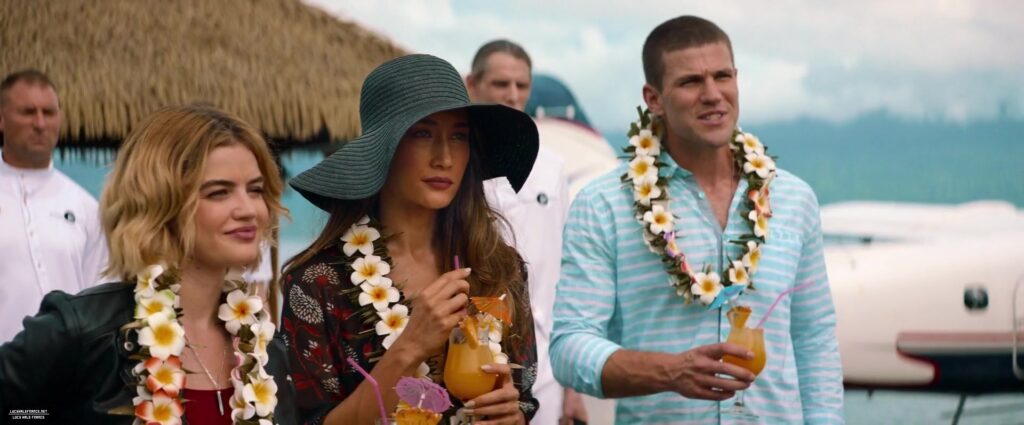
At first glance, Fantasy Island (2020) looks like just another horror-thriller, a tropical vacation gone wrong, with some cheap scares thrown in. But under all the jump scares and explosions there’s something way darker happening. This movie jumps straight into the psychology of fantasy, guilt, regret, and revenge, and how the things we think we want can end up destroying us.
Here’s why Fantasy Island is secretly a psychological horror story about human weakness.
Fantasy Island Isn’t Granting Dreams, It’s Exposing Wounds.
When the guests first arrive, it feels like a wish fulfillment paradise. Win a war, have the perfect life, get revenge on a childhood bully, seems innocent enough, right? Except none of these fantasies actually make the characters happy. Instead, the island twists their dreams, forcing them to confront their deepest fears, regrets, and traumas. Psychologically, that’s the whole trick of the movie. It’s not about giving them what they want. It’s about showing them why they wanted it in the first place and how broken that desire really is.

Regret and Guilt Are the Real Monsters
Almost every fantasy on the island is tied to a traumatic event the characters can’t move past:
- Melanie wants revenge on her childhood bully, but under her anger is deep loneliness and pain.
- Patrick wants to be a soldier like his father, but really, he’s drowning in guilt over how his relationship with his dad ended.
- Gwen dreams of a perfect life with her ex, but deep down, she’s carrying a horrible secret that she can’t forgive herself for.
Their “wishes” aren’t simply just dreams. They’re coping mechanisms. They’re band aids over deep emotional wounds. And once the island taps into that, it rips the band aids right off.
Why Revenge Fantasies Always Turn Rotten
Melanie’s storyline is probably the clearest example of how revenge fantasies work, and why they’re so dangerous. At first, she just wants to humiliate her old bully, Sloane. But once she realizes she’s actually hurting a real person, not just a symbol of her pain, the revenge stops feeling good. Instead of getting closure, Melanie feels emptier. Psychologists have long said that revenge rarely brings true satisfaction, because it doesn’t heal the original wound. It just opens a new one. Fantasy Island shows that accurately. Hurting others never actually “fixes” your own hurt. It just spreads the pain around.

The Island as a Mirror of the Subconscious
The real star of Fantasy Island isn’t Mr. Roarke or the guests. It’s the island itself. The island has a living subconscious, bringing buried fears and secret regrets to the surface. They think they’re in control, but the deeper they go, the more wrong they turn out to be. Each character is forced to realize that you can lie to yourself all you want in the real world, but you can’t lie to your own mind forever. Eventually, your regrets, your guilt, your grief, they’re gonna find you. And when they do, it won’t be pretty.
Fantasy Island Is All About Consequences
The scariest thing about Fantasy Island isn’t the supernatural stuff. It’s how real the emotional pain feels. The movie reminds us that fantasies aren’t harmless. What you think you want might actually be the very thing that wrecks you. Because at the end of the day, no fantasy can fix regret. No wish can erase guilt. No dream can undo trauma. You have to face the darkness, or the darkness will come find you.

























